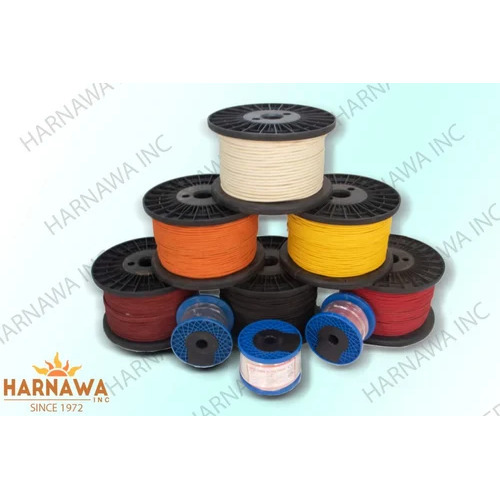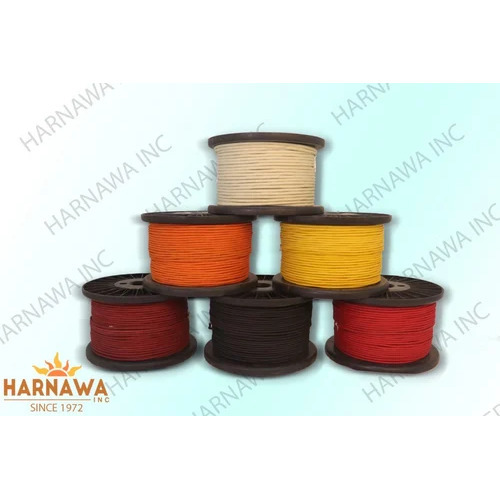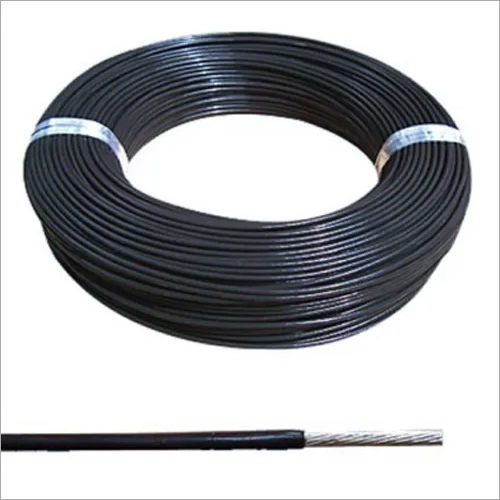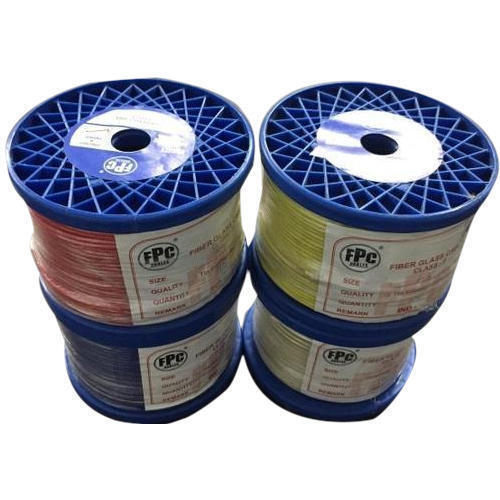

Silicon Rubber Cable
30 INR/Meter
Product Details:
- Product Type Cable
- Material Silicon and Rubber
- Rated Voltage 300-500 Volt (V)
- Insulation Material Silicone
- Length 100 Meter (m)
- Color Red, Black
- Click to view more
X
Silicon Rubber Cable Price and Quantity
- 100 Meter
- 30 INR/Meter
Silicon Rubber Cable Specification
- Silicon and Rubber
- 300-500 Volt (V)
- Cable
- 100 Meter (m)
- Silicone
- Red, Black
Silicon Rubber Cable Trade Information
- 10000 Meter Per Day
- 1 Days
Product Description
Offered Silicon Rubber Cable is manufactured from the eminent grade range of raw materials with the help of advance fabrication techniques in order to ensure its highest strength and durability. It is flexible and adaptable to all weather conditions. Offered product is heat resistant and extremely durable. It is maintenance free and demands no maintenance. Customers can avail this product from us in a diverse range of lengths as per requirements at cost efficient rates within the promised time frame.
Silicon Rubber Cable Specifications:
1. Length: 100 meters
2. Conductor: Tinned Copper
3. Insulation Material: Silicone
4. Color Available: Red, Black
5. Rated Temperature: - 60 to + 200 degree centigrade
6. Rated Voltage: 300/500 V
Applications of Silicon Rubber Cable:
Silicone rubber cables are versatile and widely used in various industries due to their excellent properties and performance characteristics. Some common applications of silicone rubber cables include:
1. Electrical Appliances: Silicone rubber cables are often used in household appliances like toasters, coffee makers, and microwave ovens. Their flexibility, heat resistance, and insulation properties make them suitable for internal wiring and connections.
2. Industrial Machinery: These cables are commonly employed in industrial equipment and machinery where they may be exposed to high temperatures, chemicals, or mechanical stress. They are used for power transmission, control, and instrumentation purposes.
3. Automotive Industry: Silicone rubber cables are used in vehicles for wiring harnesses, sensors, and connectors. Their resistance to temperature fluctuations, oil, and automotive fluids makes them suitable for automotive applications.
4. Medical Devices: Medical equipment often requires cables that are flexible, easy to clean, and can withstand sterilization processes. Silicone rubber cables meet these requirements and are used in various medical devices, such as diagnostic equipment and surgical instruments.
5. Aerospace and Aviation: Silicone rubber cables are used in aircraft and spacecraft for their ability to withstand extreme temperature variations, radiation, and other harsh environmental conditions. They are essential for avionics, sensors, and power distribution systems.
6. Renewable Energy: In solar panels and wind turbines, where exposure to UV radiation, extreme temperatures, and environmental factors is common, silicone rubber cables are used to connect and transmit power from these sources to electrical grids.
7. Marine and Offshore: Silicone rubber cables are suitable for marine and offshore applications due to their resistance to saltwater, UV radiation, and extreme weather conditions. They are used in shipboard wiring, offshore platforms, and underwater equipment.
8. Mining and Heavy Industries: In environments with high temperatures, abrasion, and chemical exposure, silicone rubber cables are used for power and control applications in mining, steel production, and other heavy industries.
9. Food and Beverage Industry: Silicone rubber cables are used in food processing and beverage production equipment where they need to meet strict hygiene and FDA compliance standards. They are resistant to cleaning agents and high temperatures.
10. Laboratory and Research: Laboratories and research facilities often use silicone rubber cables in scientific equipment and analytical instruments due to their flexibility, chemical resistance, and heat tolerance.
11. Rail and Transportation: In trains and other forms of transportation, silicone rubber cables are used for their fire resistance, low smoke emission, and resistance to vibration and mechanical stress.
12. Telecommunications: Silicone rubber cables can be found in telecommunications infrastructure and data centers where they are used for data transmission, networking, and power supply due to their durability and fire resistance.
Silicon Rubber Cable FAQ:
1. What are silicone rubber cables?
Ans: Silicone rubber cables are electrical cables that have insulation and sheathing made of silicone rubber. Silicone rubber is a synthetic rubber known for its excellent flexibility, high-temperature resistance, and resistance to chemicals and environmental factors.
2. What are the advantages of using silicone rubber cables?
Ans: Silicone rubber cables offer several advantages, including high-temperature resistance, flexibility, resistance to UV radiation, chemicals, and moisture, excellent electrical insulation properties, and durability in harsh environments.
3. Where are silicone rubber cables commonly used?
Ans: Silicone rubber cables find applications in various industries, including electrical appliances, automotive, aerospace, medical devices, renewable energy, marine, heavy industries, and more. They are chosen for their ability to perform in demanding conditions.
4. Are silicone rubber cables flame-resistant?
Ans: Yes, silicone rubber cables are often flame-resistant and have a high resistance to fire. They are commonly used in applications where fire safety is a concern, such as in railways, aerospace, and marine industries.
5. Can silicone rubber cables withstand extreme temperatures?
Ans: Yes, one of the key benefits of silicone rubber cables is their ability to withstand extreme temperatures, both high and low. They can operate in temperatures ranging from - 60 to 200 degree centigrade or even higher, depending on the specific formulation.
6. Are silicone rubber cables suitable for outdoor use?
Ans: Yes, silicone rubber cables are suitable for outdoor use. They are UV-resistant and can withstand exposure to sunlight and weather conditions without degrading.
7. Are silicone rubber cables resistant to chemicals and oils?
Ans: Silicone rubber cables are highly resistant to a wide range of chemicals and oils, making them suitable for applications in industries where exposure to such substances is common, such as automotive and industrial settings.
8. Can silicone rubber cables be sterilized?
Ans: Yes, silicone rubber cables are often used in medical devices and equipment that require sterilization. They can withstand sterilization processes like autoclaving and gamma radiation.
9. Are silicone rubber cables easy to install and terminate?
Ans: Silicone rubber cables are generally flexible and easy to work with, making them relatively easy to install and terminate. They can be stripped and terminated using standard cable termination methods.
10. What standards and certifications apply to silicone rubber cables?
Ans: Silicone rubber cables may be manufactured to meet various industry standards and certifications, such as UL, CSA, IEC, and RoHS, depending on the specific application and region.
11. Can silicone rubber cables be custom-made for specific applications?
Ans: Yes, silicone rubber cables can be customized in terms of conductor size, insulation thickness, color, and other parameters to meet the requirements of specific applications.
12. Are silicone rubber cables more expensive than other types of cables?
Ans: Silicone rubber cables can be more expensive than some other types of cables due to their unique properties and durability. However, their cost is often justified by their performance in demanding environments.
Tell us about your requirement

Price:
Quantity
Select Unit
- 50
- 100
- 200
- 250
- 500
- 1000+
Additional detail
Mobile number
Email

 English
English Spanish
Spanish French
French German
German Italian
Italian Chinese (Simplified)
Chinese (Simplified) Japanese
Japanese Korean
Korean Arabic
Arabic Portuguese
Portuguese







